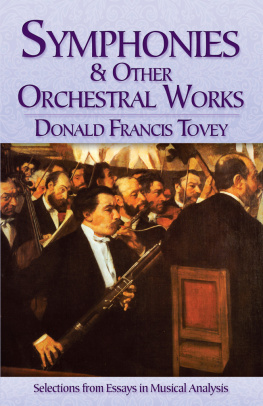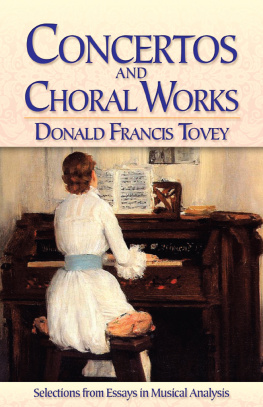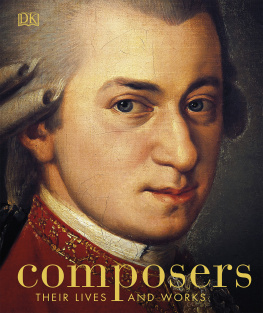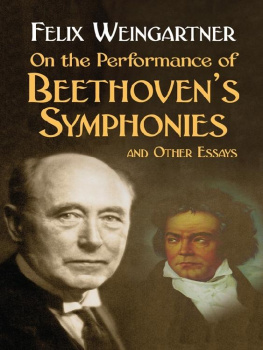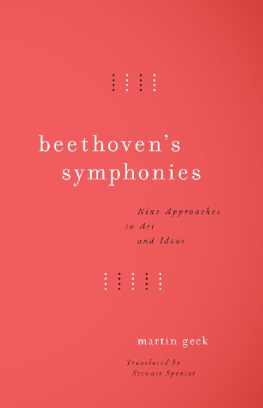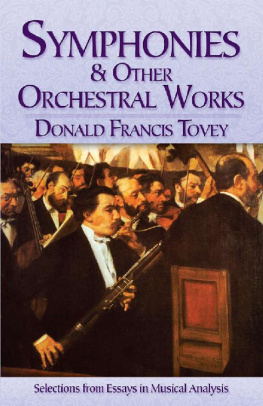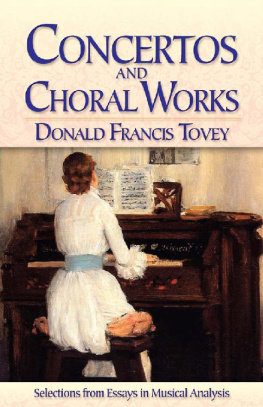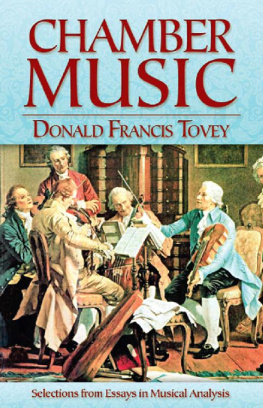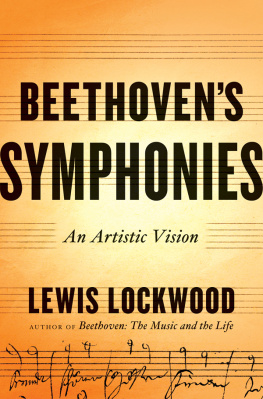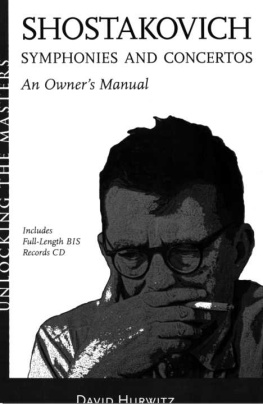S YMPHONIES
& O THER
O RCHESTRAL W ORKS
Selections from Essays in Musical Analysis
S YMPHONIES
& O THER
O RCHESTRAL W ORKS
Selections from Essays in Musical Analysis
D ONALD F RANCIS T OVEY
D OVER P UBLICATIONS , I NC .
Mineola, New York
Bibliographical Note
This Dover edition, first published in 2015, is an unabridged republication of Symphonies and Other Orchestral Works: Essays in Musical Analysis, originally published by Oxford University Press, London, in 1981.
Library of Congress Cataloging-in-Publication Data
Tovey, Donald Francis, 1875-1940.
Symphonies and other orchestral works : selections from essays in musical analysis / Donald Francis Tovey.
p. cm.
This Dover edition, first published in 2015, is an unabridged republication of Symphonies and Other Orchestral Works: Essays in Musical Analysis, originally published by Oxford University Press, London, in 1981.
eISBN-13: 978-0-486-80160-5
1. SymphoniesAnalysis, appreciation. 2. Orchestral musicAnalysis, appreciation. I. Title.
MT125.T69 2015
784.2015dc23
2014025107
Manufactured in the United States by Courier Corporation
78452501 2015
www.doverpublications.com
To
ROBERT CALVERLEY TREVELYAN
Dear Poet
These volumes must be dedicated to you. The dedication is the only part of them that has not profited by your suggestions as to grammar, syntax, punctuation, spelling, logical form, discoverable meaning, and such other negative decencies of prose as may be attained by a writer concerned only with music.
You have added much to your labours by your meticulous care not to interfere with anything that could charitably be construed as a feature of my style. The scholiast will (alas!) find these pages as unenlightened by Trevelyanese as he will find your poems free from any tendency to sink into musical analysis.
Now that I have profited by your help, my nobler instincts impel me to beg you not to give to the correction of other peoples prose too much of the time that the Muses (at least five of them, for Terpsichore controls song as well as danceI have just looked her up in Enc. Brit.) intend you to devote to your own poetry. That is the claim which the General Reader has upon you. But to him I commend your example in that you have enabled (if not knowingly permitted) me to advertise that these volumes have been read with unremitting attention by one who has not learnt musical notation, plays no instrument, and has not been heard by close friends of a quarter of a century to sing even in his bath.
Yours while these habits endure,
DONALD FRANCIS TOVEY
INTRODUCTION
T HESE essays are programme notes written for the concert room. The reader will know better than to expect from such things a complete system of criticism. The duty of the writer of programme notes is that of counsel for the defence. If the defects of the works analysed are too notorious to be ignored, he must find what can be said in favour of keeping the work in the concert repertoire. A series of essays produced under such conditions cannot have a good cumulative effect. The writer cannot even vary his optimism by praising the work in hand at the expense of something he dislikes; that procedure often irritates the reader and may become extremely inconvenient when the writer has to change his point of view. (Vide Ruskin, passim,)
The present series of essays is then certainly not designed for continuous reading. Nor, on the other hand, can it pass for a work of reference. Here again its range is limited. Programme notes need not be confined to what can be digested in the concert-room, but they cannot take the form of a work of research. I have not, in fact, made any researches beyond occasionally verifying my quotations, where they are not better unverified.
The reader of these volumes will not find that works of equal importance always receive equivalent treatment, nor will he find any system in the selection of works. Some of the analyses, e.g. that on the Eroica Symphony, were written on occasions where there was no opportunity for musical quotations, which accordingly have been added afterwards, though the letterpress has not been expanded. Others again, such as the essays on the Ninth Symphony and the B minor Mass, were published some time before the concerts for which they were written, and have accordingly taken advantage of the opportunity for a fuller treatment of their subjects.
The essay on the Ninth Symphony has been reprinted several times, and I have accordingly thought fit to supplement it by a radically different kind of analysis,I have in view in including my prcis of the Ninth Symphony: the object of inducing lovers of music to get at the bare musical facts by doing such prcis-writing themselves; and so, by their own efforts and such other guidance as they can obtain, learning what is knowable about music as music, instead of indulging in abstruse fancies which can never be matters of knowledge.
The necessary optimism of these essays, monotonous though it be, is at all events honest. The programmes were those of my own concerts, where I had no reason to produce any music I disliked. No doubt my prejudices will appear in spite of my most diplomatic efforts. It will be evident that I do not like certain kinds of oiliness and slickness, however admirable the technique with which they are often associated. But nevertheless, like Sir Charles Stanford, I simply cannot help producing Le Rouet (dOmphale and Phaeton ; they are so damned clever. On the other hand, I do not consider clumsiness and other results of a defective technique as inherently noble. But my views as to musical form are unorthodox in some matters ; and I am quite certain that the musical orthodoxy of my young days had no means whatever of knowing how far such composers as Schubert and Dvorak were right or wrong in their heavenly lengths. I was not brought up in that orthodoxy. Parrys method of analysis taught me that no piece of music can be understood from a priori generalizations as to form, but that all music must be followed phrase by phrase as a process in time. It is very unlikely that this principle has been essentially violated in these volumes.
Few technical terms are used here, and those few are not used consistently. In my Companion to Beethovens Pianoforte Sonatas I have discarded the term second subject, which has worked such havoc in our notions of sonata form and sonata themes. There is no prescribed number of subjects to a movement in sonata form ; and the only correct description of what theorists mean by the second subjects of such movements is second group, which has the merit of not necessarily implying themes at all. But these essays would need a thorough recasting before I could achieve a consistent substitution of the term second group for second subject throughout the volumes ; and the use of the old-fashioned term has not been allowed to vitiate the analysis.
With the exception of the prcis of the Ninth Symphony, none of these essays assumes any more technical knowledge than is likely to be picked up in the ordinary course of concert-going by a listener who can read the musical quotations or recognize them when played. But even the simplest musical terminology is in a very unscientific state in all languages, and the legal profession itself is not richer than music in terms that have a meaning in ordinary language widely different from their technical meaning. Accordingly I add here an explanation of the terms that are used in a musical sense in these volumes. A musical dictionary will hardly serve the readers purpose, for my terms are apt to bear a Pickwickian sense as well.
Next page
